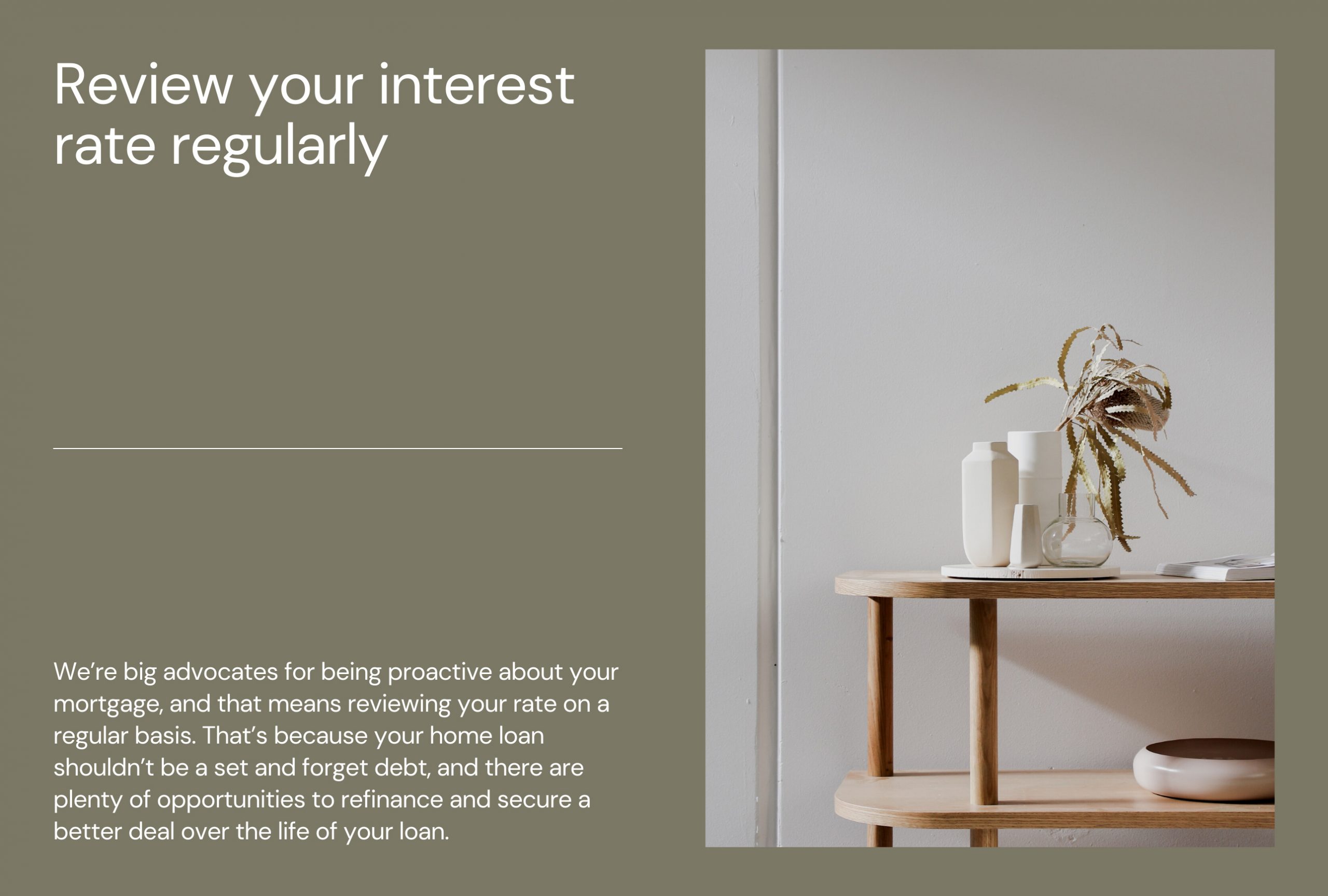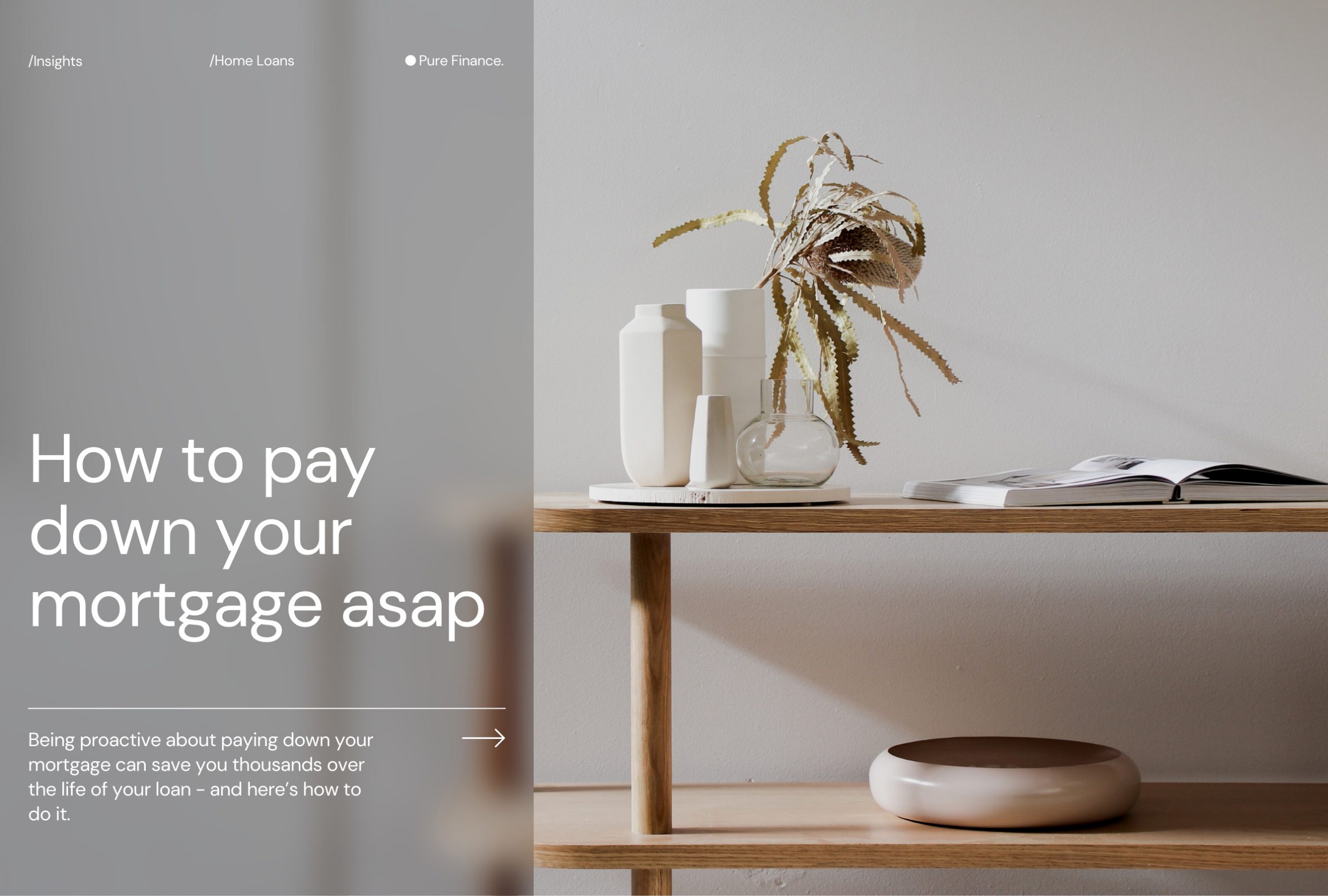As a first home buyer (or seasoned property investor for that matter), there’s stacks of advice about how to secure your first home. But what happens next?
While saving for a deposit and meeting all the initial costs of buying your first home is your top priority, paying down your mortgage should be your next focus.
And here’s why: the longer it takes you to pay down your mortgage*, the more you’ll pay in interest. Plus, not being proactive about reviewing your rate and considering refinancing may cause you to miss out on opportunities to lower the cost of your loan. *Some other loans (like certain personal loans) have interest already built into them
Luckily, we’ve got a range of practical tips to help you pay down your mortgage ASAP, so, let’s get into it.
Review your rate regularly
We’re big advocates for being proactive about your mortgage, and that means reviewing your rate on a regular basis. That’s because your home loan shouldn’t be a set and forget debt, and there are plenty of opportunities to refinance and secure a better deal over the life of your loan.
The biggest benefit of accessing a better rate is saving big on interest. The less you pay in interest, the sooner you’ll be able to pay down your principal (your original loan amount). Plus, that means you’ll build equity faster to help you grow your wealth (and potentially help you to fund things like investing in shares or securing an investment property).
**Lifehack** Don’t adjust your repayments to the new minimum following a rate reduction (as long as your comfortable making them) to pay your loan principal down even faster.
But, your options for switching products or lenders depends on what type of rate you secure when you take out your loan.
- If you’re on a variable rate: you can speak with your lender to ask for a rate review and take this opportunity to negotiate it down (without refinancing or switching banks). Plus, you can check how your rate compares to other lenders to see if it’s worth moving your loan elsewhere.
- If you’re on a fixed rate: while it’s more complicated to review your rate, it’s not impossible. See if you can break your fixed period with your lender to open up the opportunity to refinance and secure a more competitive rate.
Change to a cheaper loan product
Not all home loans are created equal. While it’s important to weigh up the interest rates of different loan options, understanding the fees and charges associated with each loan is essential too.
Each loan product and lender will charge different rates for upfront costs (such as establishment fees and valuation fees) as well as ongoing charges such as monthly or annual fees. The higher the fees, the more you pay over the course of your mortgage.
That’s why switching to a cheaper loan product can help you pay down your mortgage faster. That could mean moving to a new lender or simply switching to a new product from the same bank.
To help you understand all your options, working with a mortgage broker can be a helpful way to look beyond the big banks and find more competitive rates and cheaper loan products suited to your needs and financial situation.
Use your offset account to its full potential
You’ve probably heard about the importance of using an offset account (a transaction account linked to your home loan) to lower the amount of interest you pay. But, are you using your offset account to its full potential?
The more cash you have in this account, the less you pay in interest. Plus, you can easily access this money again if you need it in the future (so it’s not locked away for good).
Let’s look at an example: say your home loan is $450,000 with an interest rate of 5%. With $50,000 in your offset account, you’d only pay accruing interest on $400,000 of your home loan. That means you’ll pay $20,000 in interest per annum instead of $22,500 (saving you $2,500 each year - which you can put towards paying off the principal of your loan).
Make repayments more frequently
The frequency of your repayments can make a big difference in how quickly you pay down your mortgage.
Here’s why: the interest on your loan is calculated daily. So, by switching your repayment frequency from monthly to fortnightly repayments, you’ll lower the loan amount (and how much you pay in interest) and shorten the term of your loan.
So, let’s talk numbers. Say you’ve got a $500,000 loan paid over 30 years. At an interest rate of 3%, you’d pay $258,573 in interest over the life of your loan. But, if you managed to pay down your loan in 20 years, you’d only pay $165,191 in interest. That’s over $93k extra in your back pocket!

Make extra repayments
In a similar vein, making additional repayments can be a powerful strategy to get on top of your mortgage sooner.
Consider using any surplus cash, commissions or bonus money to make extra home loan repayments. Every dollar counts and will help get you closer to the finish line, sooner.
Pay off the principal (not just interest)
The way you structure your loan has a big impact on how much you pay and how quickly you pay it off. While an interest-only loan might be a cost effective way to get into the market, it’ll take significantly longer to pay off your mortgage with this loan structure.
Instead, it’s worth considering a principal and interest loan that means you’re chipping away at the original loan amount as well as an interest at the same time.
Leverage the benefits of a credit card
In some cases, it can be helpful to use a 55 day interest-free credit card to help you pay down your mortgage as soon as possible. But, it’s important to be aware of the costs you may incur if you don’t pay off the card in full before this period ends.
By using this credit card to pay for your monthly expenses, you can maximise your offset account balance performance. That’s because your money will remain untouched and will continue reducing how much you pay in interest.
The key is to ensure you pay off the credit card within 55 days to ensure you don’t get hit with interest charges. The benefit here is you’ll save in interest on your loan, and may even accrue Frequent Flyer points while you’re at it.
Consolidate your debts
Last, but certainly not least, is our final tip: debt consolidation. It makes sense: by bringing all your debts into your mortgage you’re paying just one set of fees and interest charges. Plus, you have a clearer picture of your financial position and how close you are to paying everything off.
This means looking at all your high interest debts that aren’t tax deductible (such as personal loans and unpaid credit cards) and consolidating them into your mortgage to score a lower interest rate.
With less spent on interest, you’ll be able to put these extra funds towards paying off your home loan faster.
The key to paying down your mortgage as soon as possible is to be proactive about your home loan. By regularly reviewing your rate, making more frequent repayments and even taking extra steps like consolidating your debts, you’ll be in the best position to score the most competitive loan, speed up your repayments and save big over the loan term.
The finance information contained in this post is general advice only, and doesn't take into account your personal circumstances or goals. You should always reach out, or seek professional advice, before making any financial decisions.
